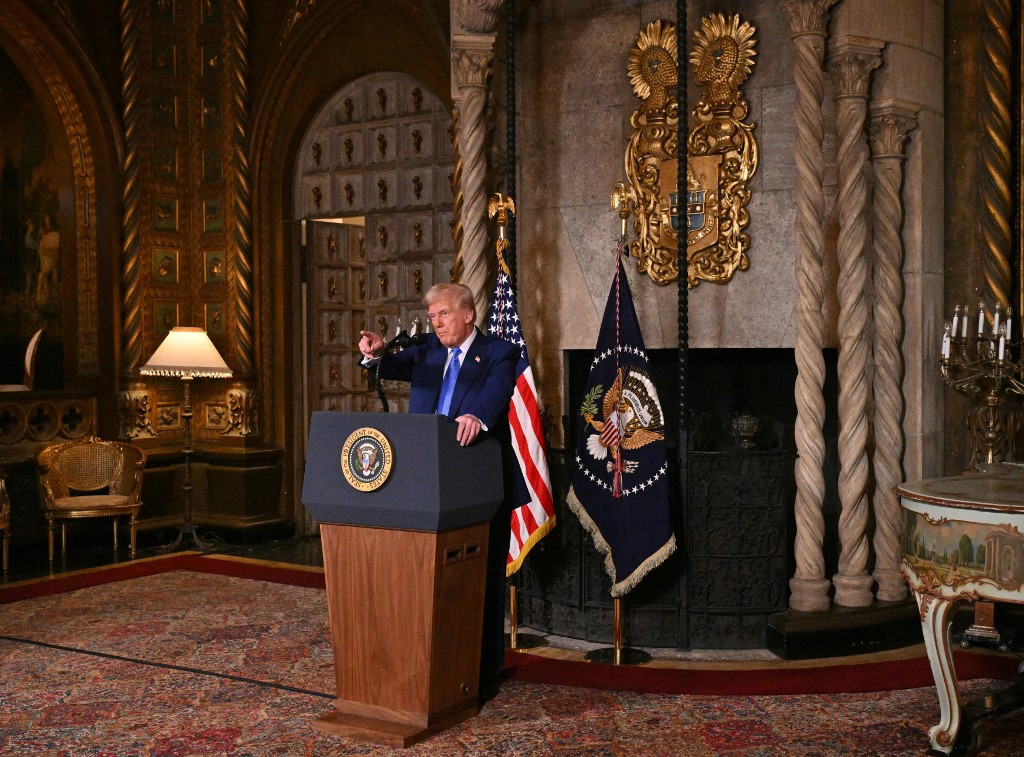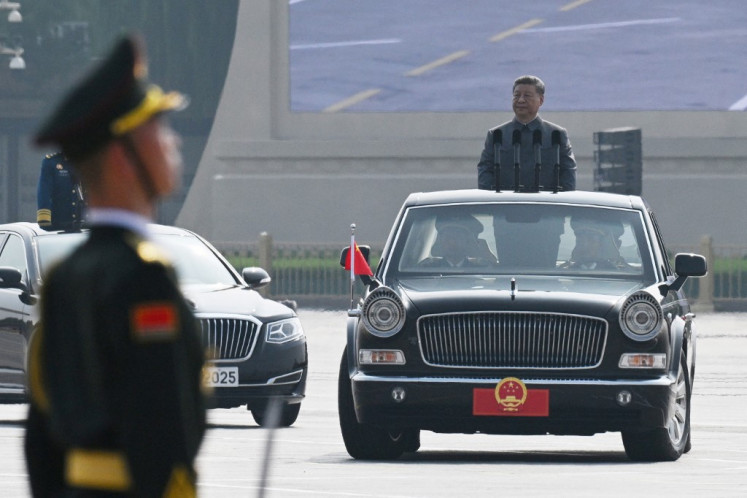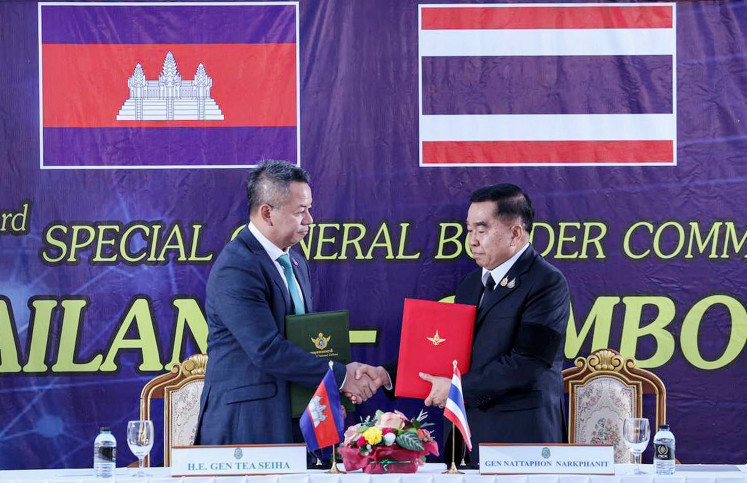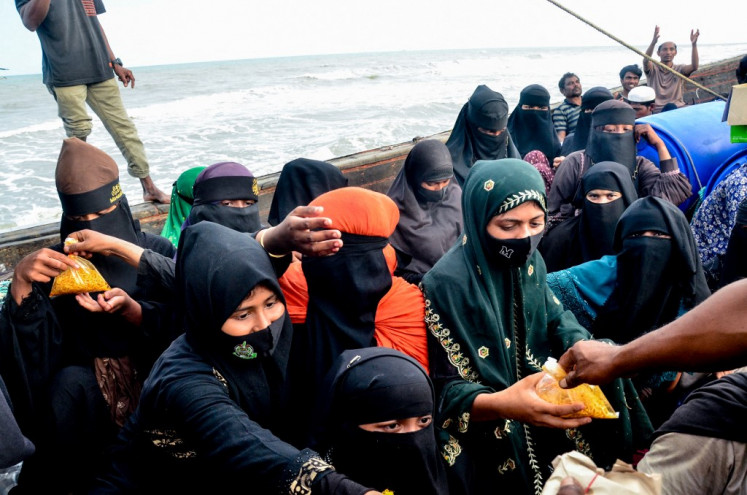Popular Reads
Top Results
Can't find what you're looking for?
View all search resultsPopular Reads
Top Results
Can't find what you're looking for?
View all search resultsThe primacy of our national interest under Trump 2.0: A new global order in the making?
Amid these new realities, it might be opportune to ponder Indonesia’s readiness to weather potential storms coming from the White House.
Change text size
Gift Premium Articles
to Anyone
A
misty Oslo embraced Director General Abdul Kadir Jailani of the Foreign Ministry on his brief visit to Norway to partake in the Global Alliance for the Implementation of the Two-State Solution’s high-level meeting on Jan 14 and 15.
The Global Alliance for the Implementation of the Two-state Solution brought together representatives from various countries and United Nations organizations such as the UN Relief and Works Agency for Palestine Refugees (UNRWA).
Participants in the meeting shared news that a ceasefire in the asymmetric warfare in Gaza was in the works. By then, the glimmering hope for peace was like a light at the end of the tunnel.
Fast forward to today, a three-phase ceasefire in Gaza is in place. Yet we should refrain from sighing with relief, bearing in mind the topsy-turvy global order since the swearing in of United States President Donald J. Trump.
The world we are living in is now appears mired in uncertainties, and there seems to be no limit for surprises coming from the White House. We are continuously delving into streams of text on social media platforms X and Truth and trying to make sense of unorthodox statements and policy gambits by President Trump.
Indeed, leaders across the globe are grappling to make sense of recent salvos of statements. A few anecdotal examples are President Trump’s statements about bringing Canada into the fold of the US and making it the 51st state, as well as making Gaza the riviera of the Middle East.
The dismantling of the USAID signifies a shift in diplomatic approach under President Trump, from the application of soft power diplomacy to the use of coercive power when necessary.
Hence, negotiations, or perhaps more aptly bargaining from a position of strength, will most likely become more the norm. During the negotiation process, the main objective will revolve around what benefit they can gain. Consequently, the fewer parties in the process, the better it will be.
This is evident in the case of the war in Ukraine, with the US taking the lead by negotiating directly with Russia and bypassing the European countries.
The perplexed European leaders have yet to have the privilege to sit around the negotiating table. In response, President Macron of France initiated emergency meetings among European leaders to send a strong signal that Europe matters and the issue of Ukraine is central to their security. Thus, they should not be put on the margins of the negotiation.
A retired Norwegian diplomat that I met recently explained this quandary very aptly, ″Europe would be better off sitting at the main table rather than be part of the menu”.
Amid these new realities, it might be opportune to ponder Indonesia’s readiness to weather potential storms coming from the White House, and regarding that matter, three lines of thought come to mind.
The first is the applicability of the old maxim that there are no permanent friends or enemies, but only permanent interests. Therefore, we should be more disciplined in prioritizing our national interests in addressing a wide range of international issues.
There is no harm to cautiously applying a self-centered approach in the wake of “my country’s first” tendency. For example, as international support and commitment towards Indonesia Just Energy Transition Partnership (JETP) is weakening, we might need to recalibrate our ambition to achieve new renewable energy capacity by 2050.
To compensate, we should capitalize more from our position of strength, as a country blessed with abundant rainforest and ocean biodiversity. A partnership with countries and philanthropists to finance programs such as Forestry and Other Land Use (FOLU) Net Sink 2030 can help us achieve the goal of zero emissions.
Second, we must sustain our investment in diplomatic activism to maintain our international standing and relevance against a plethora of international issues and challenges.
It is therefore essential for Indonesia to strengthen regional cooperation in ASEAN, to have its concerns heard and contributions felt internationally, to engage in a win-win economic relations — if necessary as part of hedging for security risk, such as with the US and China – and to participate actively in minilateralism.
Minilateralism is increasingly gaining traction because they allow governments to cement partnerships based on shared interests. On its part, Indonesia has been actively engaged in and promoting minilateralism, among others through BRICS and MIKTA.
Moreover, Indonesia has championed the idea of creating an OPEC-like framework where resource-rich countries can negotiate for fairer trade in minerals, such as nickel and cobalt. With the rapid growth in energy technologies, access to and control of critical minerals and rare earth elements have become a new frontier in international relations.
Third, countries across the globe, especially among the Global South, should work together to realize their collective aspiration for a new set-up of the international order based on the ideas and beliefs at the present time (zeitgeist). Many pundits argue that the post-World War II global order and the so-called “rules-based international order” may no longer be suitable.
In the final analysis, the second term of President Trump has led to a myriad of global uncertainties wherein national interest reigns supreme.
However, let us stay positive and look for brighter days ahead in the global arena.
---
The author is the Indonesian Ambassador to Norway and Iceland, he obtained a PhD in peace studies and conflict resolution at the University of Waikato, New Zealand. The views expressed are his own.











